Gonzo Series (6 / 9)
Buy the Ticket, Take the Ride VI
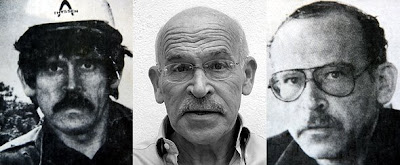

6. Günter Wallraff
Wallraff, bookseller and worker rather than a journalist, is surely the gonzo journalist with an ideological and social commitment more established, and one of the best investigative reporters ever seen. His immersion in the scene is quite radical and complete, without hesitation and in order to expose injustice. A transitional period in any order. As gonzo journalism of HST, the point of view Wallraff is the protagonist narrator. Wallraff is masked and live events in the first person impersonating identities (Al), but her will is testimonial and conscientiously. The German journalist unlike HST is not shown, but is masked and acts to access realities that through its presence as a journalist would be massaged by the authorities or directly blocked. Also camouflage is effective to overcome self-censorship exploited themselves, often scary and unlikely to compromise their miserable stability. That is, while HST is not hidden, Wallraff is forced to silence their professional practice. His implication is absolute and laborious preparation of their projects, as evidenced by his landing in Soweto under apartheid as a backdrop, frustrated when Mandela was released. Wallraff records it all (secret recordings, photographs, photocopies) with the purpose of safeguarding the best possible future litigation. In his fieldwork, its staging and writing, adds the address of orchestra where copes with all threats and adverse reactions while stimulating their work, and most helpful, if possible, to enlighten the hie nas. Reissues of some of their stories, with some parts deleted at the request of the courts, being replaced by new these details, is but a mockery of the judicial system and serfdom. 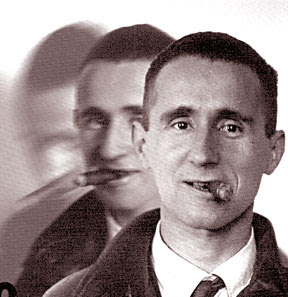
Wallarff speaks in first person, but it connects the reader with the experiences of the voiceless and lvidados or by large, medium and small companies. His prose is simple and blunt, without much ornamentation. A point of view, the narrator-witness, combined with some editorial omniscience and extensive fieldwork. Thus we find in its pages reports, photographs, newspaper clippings, while extending the information in his narrative, often with specialized sources always necessary to understand more tino risks and situations narrated. In addition, Wallraff puts great care in the reproduction of dialogue combining completeness and immediacy.
 Wallraff Very often been litigated with allegations called into question the legality of gonzo journalism so well concealed. A journalism that causes real fear among employers and public authorities. The is the eternal dilemma: Does the end justify the means? Is it legal and moral for a journalist to lie to get to the facts? Perhaps the concern is a context, both legal and human, in which the journalist can not ever access the reportable situations and are forced at their own risk to cross barriers guarded by the murky legality. Fortunately, freedom of press and public interest have prevailed, and research methods have been enacted constitutional Wallraff. The operating period covered by laws can ever prevail or restrict fundamental rights, like the abuse of power can not blend in with the defense of honor. Wallraff Brechtian adheres to the ideology and says, "You have to disguise to expose society, is to cheat and pretend to find out the truth. " A categorical denunciation to the judicial scaffold, helpful to the capital and deaf to the oppressed. Perhaps the journalist travels sometimes illegal methods, but not unlawful. In an interview in July Saw The Country , Wallraff declared "If there were in the RFA is real freedom of expression should not use these methods work."
Wallraff Very often been litigated with allegations called into question the legality of gonzo journalism so well concealed. A journalism that causes real fear among employers and public authorities. The is the eternal dilemma: Does the end justify the means? Is it legal and moral for a journalist to lie to get to the facts? Perhaps the concern is a context, both legal and human, in which the journalist can not ever access the reportable situations and are forced at their own risk to cross barriers guarded by the murky legality. Fortunately, freedom of press and public interest have prevailed, and research methods have been enacted constitutional Wallraff. The operating period covered by laws can ever prevail or restrict fundamental rights, like the abuse of power can not blend in with the defense of honor. Wallraff Brechtian adheres to the ideology and says, "You have to disguise to expose society, is to cheat and pretend to find out the truth. " A categorical denunciation to the judicial scaffold, helpful to the capital and deaf to the oppressed. Perhaps the journalist travels sometimes illegal methods, but not unlawful. In an interview in July Saw The Country , Wallraff declared "If there were in the RFA is real freedom of expression should not use these methods work."
Also, as any gonzo journalism , Wallraff shows guts of the few contemporary journalist, spokesman for administrative profile and indifferent to the work of thousands of rotting workers: they are self-satisfied and without regard to their routines ennoblement of the owners of such factories or business groups. In short: hacks built into the system, well-paid. Infiltration greatly stands out for 4 months ( On the Art of the headlines. Wallraff, alias Hans Esser, journalist Bild) in the newspaper Bild, tabloid prototype in order to make his way manipulate and distort the facts.
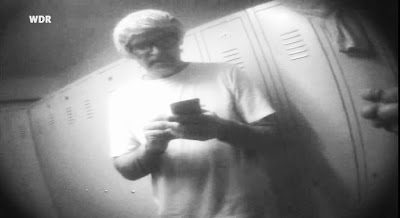
The commitment and talent to boot Wallraff the shadows and make the facts public in their crusade to denounce the free market system based on oppression of capital, can see the influence of journalists as the Czech Egon Erwin Kisch, known as reporter rasender (reporter dared) and friend of Brecht, who was already using illegal methods scrubbed. However, in two overlapping Walrraff background. First, they admired Émile Zola and nonfiction, but especially muckrakers Americans of the late nineteenth and early twentieth century, gathered many of them in the magazine Collier's Weekly and especially under the leadership of Norman Hapgood as a director. The muckrackers are scavengers of manure and pioneers of investigative journalism and reporting. In the early twentieth century attacked strongly against the shortcomings of the capitalist system, as they attacked the corruption of politicians and businessmen, the poor conditions of workers and immigrants, child prostitution, the role of women ... always with the label at the expense of Communists and Socialists in a country that looked suspiciously. Upton Sinclair, Nellie Bly, Ida Tarbell, Lincoln Steffens, Ray Standard and Riis, or contemporaries such as Ralph Nader, are some names. They all reported with transforming vocation - and also why not say, with some sensational - with the aim of shaking and make society aware of the inequalities and corruption that sheltered within it. A rebellious spirit which today are in the realm of ideas and testing, but no action journalistic reporting.
His book is distinguished scapegoat, probably the best example of gonzo journalism ever written. Through Ali, a young Turkish illegal in West Germany, Wallraff leads us down the hall of horrors to the high Europe civilized and cultured. Xenophobia, oppression and slavery silent criminal entrepreneurs in collusion with government, mengelenianos projects, etc.. "Explore the limits of human depravity, Wallraff unsuspected forces us to probe Honduras and get a laugh at the foul bowels of the top European, cultured and civilized," wrote Juan Goytisolo. To his enemies (patronage, public authorities and envious journalists) is an irresponsible Wallraff fan the flames of class struggle, as well pray some pamphlets against the journalist. However, his writings are valuable documents and put faces to the suffering outlined in computer graphics and loosely organized paragraphs in the history books. Evidence of the true challenge posed by his writings is the fact that has been subjected to illegal surveillance, such were the efforts of some powers to paralyze his journalism and revolutionary.
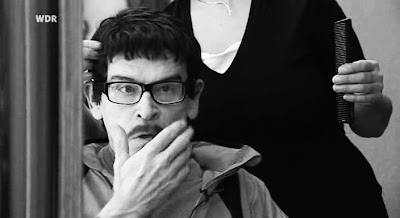
In sum, Wallraff is the best gonzo journalist because their stories are the paradigm of investigative reporters, the result of a methodical fieldwork and also with a sense of progress and well-defined orientation. Wallraff not released as HST, on occasion, to adventure, to see that game on the fly. Wallraff is a journalist and reporting to transform consciousness, regardless. Likewise, immersion in the story does not encyst in a cogorza of self. Instead, they are reporting more pluralistic and belies his vision through the presentation of scenes, in a direct style that puts any concession stylistic crudeness. The game of yo-yo is left by the wayside for the applause. The reader can not escape the reality can not take shelter: the gruesome and surreal freezes the blood. undesirable journalist, a title which also gives its name to a collection of articles written between 1966 and 1977, probably is the power both to readers who only accept that journalism, distilled to sparing sips and smug.
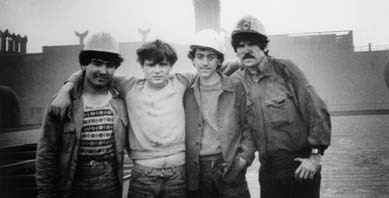

Wallarff speaks in first person, but it connects the reader with the experiences of the voiceless and lvidados or by large, medium and small companies. His prose is simple and blunt, without much ornamentation. A point of view, the narrator-witness, combined with some editorial omniscience and extensive fieldwork. Thus we find in its pages reports, photographs, newspaper clippings, while extending the information in his narrative, often with specialized sources always necessary to understand more tino risks and situations narrated. In addition, Wallraff puts great care in the reproduction of dialogue combining completeness and immediacy.
Today, anyone who wishes to combat lies and ignorance and to write the truth must overcome at least five difficulties. Lacks the courage to write the truth, when drowning everywhere, intelligence discovered it when they hide everywhere, art as a weapon to make it manageable, and the trial to select those in whose hands will be effective, the cunning to spread it among themselves. These difficulties are great for those who were expelled or fled, and even for those who write in the countries of bourgeois freedom.
Five difficulty writing the truth . Bertolt Brecht.
 Wallraff Very often been litigated with allegations called into question the legality of gonzo journalism so well concealed. A journalism that causes real fear among employers and public authorities. The is the eternal dilemma: Does the end justify the means? Is it legal and moral for a journalist to lie to get to the facts? Perhaps the concern is a context, both legal and human, in which the journalist can not ever access the reportable situations and are forced at their own risk to cross barriers guarded by the murky legality. Fortunately, freedom of press and public interest have prevailed, and research methods have been enacted constitutional Wallraff. The operating period covered by laws can ever prevail or restrict fundamental rights, like the abuse of power can not blend in with the defense of honor. Wallraff Brechtian adheres to the ideology and says, "You have to disguise to expose society, is to cheat and pretend to find out the truth. " A categorical denunciation to the judicial scaffold, helpful to the capital and deaf to the oppressed. Perhaps the journalist travels sometimes illegal methods, but not unlawful. In an interview in July Saw The Country , Wallraff declared "If there were in the RFA is real freedom of expression should not use these methods work."
Wallraff Very often been litigated with allegations called into question the legality of gonzo journalism so well concealed. A journalism that causes real fear among employers and public authorities. The is the eternal dilemma: Does the end justify the means? Is it legal and moral for a journalist to lie to get to the facts? Perhaps the concern is a context, both legal and human, in which the journalist can not ever access the reportable situations and are forced at their own risk to cross barriers guarded by the murky legality. Fortunately, freedom of press and public interest have prevailed, and research methods have been enacted constitutional Wallraff. The operating period covered by laws can ever prevail or restrict fundamental rights, like the abuse of power can not blend in with the defense of honor. Wallraff Brechtian adheres to the ideology and says, "You have to disguise to expose society, is to cheat and pretend to find out the truth. " A categorical denunciation to the judicial scaffold, helpful to the capital and deaf to the oppressed. Perhaps the journalist travels sometimes illegal methods, but not unlawful. In an interview in July Saw The Country , Wallraff declared "If there were in the RFA is real freedom of expression should not use these methods work." Also, as any gonzo journalism , Wallraff shows guts of the few contemporary journalist, spokesman for administrative profile and indifferent to the work of thousands of rotting workers: they are self-satisfied and without regard to their routines ennoblement of the owners of such factories or business groups. In short: hacks built into the system, well-paid. Infiltration greatly stands out for 4 months ( On the Art of the headlines. Wallraff, alias Hans Esser, journalist Bild) in the newspaper Bild, tabloid prototype in order to make his way manipulate and distort the facts.

The commitment and talent to boot Wallraff the shadows and make the facts public in their crusade to denounce the free market system based on oppression of capital, can see the influence of journalists as the Czech Egon Erwin Kisch, known as reporter rasender (reporter dared) and friend of Brecht, who was already using illegal methods scrubbed. However, in two overlapping Walrraff background. First, they admired Émile Zola and nonfiction, but especially muckrakers Americans of the late nineteenth and early twentieth century, gathered many of them in the magazine Collier's Weekly and especially under the leadership of Norman Hapgood as a director. The muckrackers are scavengers of manure and pioneers of investigative journalism and reporting. In the early twentieth century attacked strongly against the shortcomings of the capitalist system, as they attacked the corruption of politicians and businessmen, the poor conditions of workers and immigrants, child prostitution, the role of women ... always with the label at the expense of Communists and Socialists in a country that looked suspiciously. Upton Sinclair, Nellie Bly, Ida Tarbell, Lincoln Steffens, Ray Standard and Riis, or contemporaries such as Ralph Nader, are some names. They all reported with transforming vocation - and also why not say, with some sensational - with the aim of shaking and make society aware of the inequalities and corruption that sheltered within it. A rebellious spirit which today are in the realm of ideas and testing, but no action journalistic reporting.
Realistic means: it reveals the complex coincidence of social relations which exposes the key ideas as the ideas of the ruling class.
Bertolt Brecht
His book is distinguished scapegoat, probably the best example of gonzo journalism ever written. Through Ali, a young Turkish illegal in West Germany, Wallraff leads us down the hall of horrors to the high Europe civilized and cultured. Xenophobia, oppression and slavery silent criminal entrepreneurs in collusion with government, mengelenianos projects, etc.. "Explore the limits of human depravity, Wallraff unsuspected forces us to probe Honduras and get a laugh at the foul bowels of the top European, cultured and civilized," wrote Juan Goytisolo. To his enemies (patronage, public authorities and envious journalists) is an irresponsible Wallraff fan the flames of class struggle, as well pray some pamphlets against the journalist. However, his writings are valuable documents and put faces to the suffering outlined in computer graphics and loosely organized paragraphs in the history books. Evidence of the true challenge posed by his writings is the fact that has been subjected to illegal surveillance, such were the efforts of some powers to paralyze his journalism and revolutionary.

In sum, Wallraff is the best gonzo journalist because their stories are the paradigm of investigative reporters, the result of a methodical fieldwork and also with a sense of progress and well-defined orientation. Wallraff not released as HST, on occasion, to adventure, to see that game on the fly. Wallraff is a journalist and reporting to transform consciousness, regardless. Likewise, immersion in the story does not encyst in a cogorza of self. Instead, they are reporting more pluralistic and belies his vision through the presentation of scenes, in a direct style that puts any concession stylistic crudeness. The game of yo-yo is left by the wayside for the applause. The reader can not escape the reality can not take shelter: the gruesome and surreal freezes the blood. undesirable journalist, a title which also gives its name to a collection of articles written between 1966 and 1977, probably is the power both to readers who only accept that journalism, distilled to sparing sips and smug.

0 comments:
Post a Comment